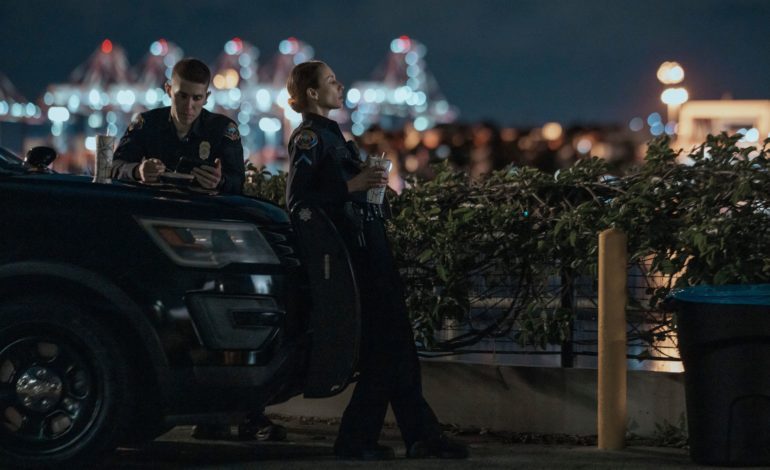

Episode 7 portrays the contracting sides of policing experienced by millions of communities in this country. We see the empathetic peace officer many wish were present to heal years of public mistrust, and the raw, militaristic weapon many police departments have become in their efforts to maintain law and order.
The episode opens with the audience meeting fallen Officer Delgaldo’s family. Harmon and Diaz greet Delgaldo’s parents and two young daughters at the precinct as they collect the last of her belongings. This bittersweet moment is followed by Diaz’s mother and a relative wanting answers about her son’s sudden transfer to another facility. At first, she is upset Diaz didn’t tell her and can’t reveal where Gabriel has been moved. Diaz reassures her he’s safe. Harmon takes responsibility for the action and requests to take the blame. In an instant, Diaz’s mother thanks Harmon, realizing she has both her sons’ best interests at heart.
This rare placid moment is interrupted by the reality of violence in Long Beach: a robbery at a weed dispensary goes wrong when a worker and a nearby child are shot. From the surviving witness’ testimony, the gunmen knew exactly where the safe was located, indicating a possible inside job. Soon, reports of the same masked men in a residential area come through the radio. A home is robbed, this time explosives are used to access a wall safe. The rampant violence incurs the police force to go on the offensive, something Harmon disagrees with.
Here, the police force announces a Stage 2 Tactical Alert as they believe the robberies are gang-related. Under this protocol, police are guided to arrest any member with an open warrant. As Lasman describes it: “no bullshit policy or red tape.” The force raids East Barrio neighborhoods, rounding up men in these mostly Latino communities, of all ages, for no reason. A mother cries about how her son hasn’t done anything wrong, while other men are brutally detained and taken to jail for holding. Amid the arrests, Harmon and Diaz go rogue and discover the location of the masked thieves. Sadly, they’re too late as someone has already killed them.
The two men’s deaths push Harmon over her limit, and she takes her frustrations out on Sergeant Lasman. She argues this tactic doesn’t deliver solutions, and ruins the 12 years of trust she has built with the community. Lasman retorts back arguing he grew up in the community, a block from where the now-deceased youth victim was shot. Harmon insists they’ve got to be better.
This climatic scene encapsulates the series’ theme: the morality of policing. Is there a way to police soundly without harming those these agencies are to serve and protect? Or does the solution rest elsewhere beyond the hands of police, and in the systems that keep populations rich in poverty, lack of opportunities, and violence? This series isn’t offering a solution, and it doesn’t have to. But it’s questioning is important.
Rating: 8.5/10
